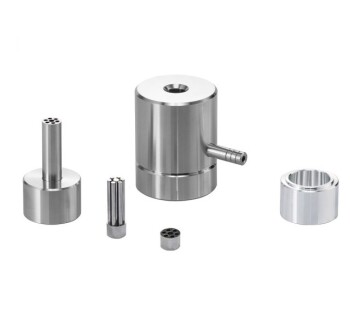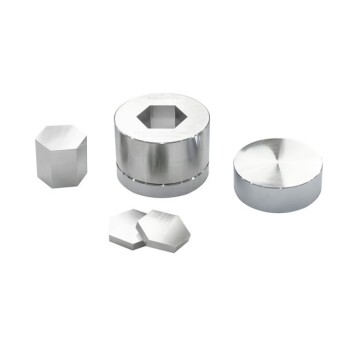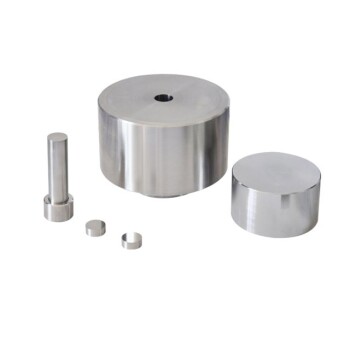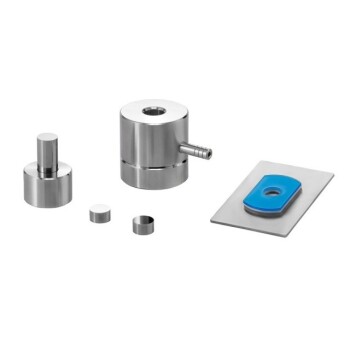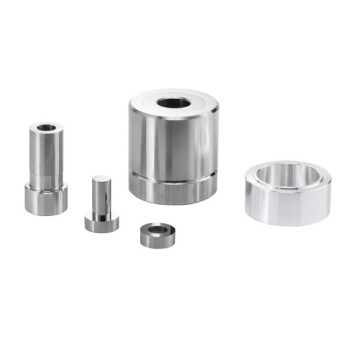In polymer processing, a heated lab press is a foundational tool used to synthesize new materials, fabricate composites, and, most commonly, prepare standardized samples for analysis. By precisely applying controlled heat and pressure, these presses transform raw polymer powders, pellets, or resins into uniform, consolidated shapes like thin films or solid plaques, which are essential for testing and characterization.
The core function of a heated lab press is to create a controlled thermodynamic environment. It allows a user to precisely manipulate a polymer’s form and internal structure, making it an indispensable bridge between theoretical material science and tangible, testable results.

The Fundamental Principle: Controlling a Polymer's State
At its heart, a heated lab press manipulates the physical state of a polymer. It combines two primary forces—thermal energy and mechanical pressure—to achieve a desired outcome.
The Role of Heat
Heat is applied through the platens of the press to raise the polymer's temperature above its glass transition temperature (for amorphous polymers) or melting temperature (for semi-crystalline polymers).
This thermal energy gives the polymer chains enough mobility to flow, disentangle, and move past one another. Without sufficient heat, the material remains a rigid solid and cannot be molded.
The Role of Pressure
Once the material is molten and flowable, pressure is applied. This force compacts the polymer, eliminating air voids and ensuring the creation of a dense, homogenous part.
Pressure also guarantees intimate contact between the molten polymer and the mold surface, allowing for the precise replication of the desired shape, be it a thin film or a thick test plaque.
Key Applications in the Polymer Workflow
A heated press is not used for a single purpose but serves multiple critical functions across the research, development, and quality control lifecycle of a polymer.
Sample Preparation for Analysis
This is arguably the most frequent use of a lab press. To obtain reliable and repeatable data, polymer samples must be prepared according to strict international standards (like ASTM or ISO).
The press is used to mold common thermoplastics like polyethylene (PE), polypropylene (PP), and polystyrene (PS) into specific shapes required for various analytical techniques, including:
- Thin Films: For spectroscopic analysis such as FTIR.
- Solid Plaques: For mechanical testing (tensile strength, flexural modulus, impact resistance).
- Flat Discs: For color measurement, weathering tests, or X-Ray Fluorescence (XRF) analysis.
Polymer Synthesis and Curing
For thermosetting polymers and some specialized polymerization reactions, the heated press acts as a small-scale reactor.
By holding monomers or pre-polymers under specific heat and pressure profiles, the press can initiate and control polymerization, accelerating the conversion of small molecules into long-chain polymers or curing a resin into a final, cross-linked network.
Fabrication of Composite Materials
Heated presses are essential for creating laminated composites and other multi-layer structures.
By stacking layers of materials (e.g., polymer films, fiber mats, or wood veneers) and applying heat and pressure, the press facilitates bonding between the layers. The heat activates adhesive resins while the pressure ensures a strong, void-free bond, resulting in durable composite panels or sheets.
Understanding the Trade-offs and Limitations
While versatile, a heated lab press is not a universal solution. Understanding its limitations is key to using it effectively.
Not for Complex Geometries
Lab presses excel at producing flat, two-dimensional shapes like films, sheets, and plaques. They are not designed for creating intricate, three-dimensional parts.
For complex geometries with undercuts, internal features, or fine details, other processing methods like injection molding or 3D printing are required.
A Batch Process, Not Continuous Production
A laboratory press operates on a batch-by-batch basis. The process involves loading the material, running the heat and pressure cycle, cooling, and then demolding the part.
This makes it ideal for research, prototyping, and small-scale quality control, but completely unsuitable for the high-volume, continuous manufacturing seen in industrial production lines.
Material and Flow Constraints
The static, compressive force of a press is different from the high-shear environment of an extruder or injection molder. Some highly viscous polymers may not flow and fill a mold cavity effectively under compression alone.
This method is best suited for materials with good thermal stability and appropriate melt flow characteristics for compression molding.
Making the Right Choice for Your Goal
The primary value of a heated lab press is its ability to create standardized, reproducible materials. How you use it depends entirely on your end objective.
- If your primary focus is material characterization: Use the press to create perfectly uniform films and test plaques that meet ASTM/ISO standards for reliable mechanical and analytical testing.
- If your primary focus is developing new thermosets or composites: Leverage the press as a controlled reactor to cure resins and bond layers for creating and testing novel material formulations.
- If your primary focus is basic polymer synthesis: The press can serve as an environment for studying high-pressure polymerization and its effect on molecular structure.
Ultimately, the heated lab press is the tool that transforms abstract polymer concepts into physical samples you can see, touch, and measure.
Summary Table:
| Function | Key Applications | Materials Used |
|---|---|---|
| Sample Preparation | Thin films for FTIR, solid plaques for mechanical tests | Thermoplastics (PE, PP, PS) |
| Polymer Synthesis | Curing thermosets, high-pressure reactions | Monomers, pre-polymers, resins |
| Composite Fabrication | Laminating layers, bonding materials | Polymer films, fiber mats, wood veneers |
Ready to enhance your polymer processing with precision? KINTEK specializes in lab press machines, including automatic, isostatic, and heated lab presses, designed to meet your laboratory needs for sample preparation, material synthesis, and composite development. Our equipment ensures reliable, standardized results, helping you achieve accurate testing and efficient R&D. Contact us today to learn how our solutions can benefit your lab!
Visual Guide

Related Products
- Automatic High Temperature Heated Hydraulic Press Machine with Heated Plates for Lab
- Lab Heat Press Special Mold
- Manual Heated Hydraulic Lab Press with Integrated Hot Plates Hydraulic Press Machine
- Laboratory Manual Heated Hydraulic Press Machine with Hot Plates
- Special Shape Lab Press Mold for Laboratory Applications
People Also Ask
- Why is a heated hydraulic press essential for Cold Sintering Process (CSP)? Synchronize Pressure & Heat for Low-Temp Densification
- Why is a hydraulic heat press critical in research and industry? Unlock Precision for Superior Results
- What industrial applications does a heated hydraulic press have beyond laboratories? Powering Manufacturing from Aerospace to Consumer Goods
- How does using a hydraulic hot press at different temperatures affect the final microstructure of a PVDF film? Achieve Perfect Porosity or Density
- What is the core function of a heated hydraulic press? Achieve High-Density Solid-State Batteries




